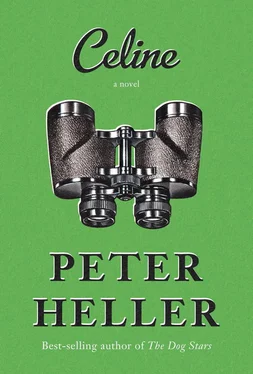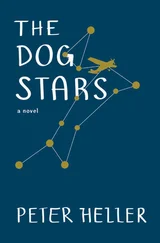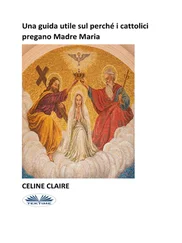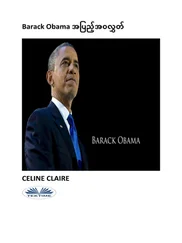“Didn’t I give you one?” sighed the waitress. “It’s been one of those mornings. My littlest kept me up all night with stomach pains.”
“Is she eating enough fruit?” Celine said. She looked carefully at the girl’s face. Young forties, a bit too young. It was a habit to study all women who might have been born in 1948. Anyway, her bone structure was all wrong.
“Come to think of it,” the woman said, “she eats zero fruit. If it’s not a Cocoa Puff or a chicken finger it’s a flying object.”
“Well.”
“Hold on, I’ll print you out another.”
Celine leaned on the counter and slid a box of charity Life Savers to the edge on the waitress’s side and then nudged it over. It hit the floor with a clatter. “Oh!” the waitress cried. “Oh, terribly sorry!” Celine countered. The woman bent to gather up the candy packets and Celine leaned over again, twisted the spindle of receipts in her fingers until the top one was readable and quickly snapped three photos of it with her camera. While the woman was still crouched and showing her broad back, Celine calmly reviewed the pictures, frowned, and on second thought simply snagged the receipt off the skewer and put it in her jacket pocket.
“There,” the waitress said cheerfully, setting the box back in its place. “If the day keeps going like this I’ll need a straitjacket by lunch.”
“I found it,” Celine sang, brashly holding up the man’s ticket, and placing a thumb over the hole. “My bad.” She gave the girl her movie-star smile, overpaid for a box of stale Life Savers, and went out the door.
Pa was impressed. “Why didn’t you just take a picture of it with your camera?” he asked as they approached the gate at the south entrance to Yellowstone. A short line of five cars was ahead of them.
Celine sucked the candy in her mouth. “I did, but the color was terrible. And what if you dropped my camera in the cat dish?” Ouch. He had done that a month ago with his new mini Canon—out of his breast pocket and into Big Bob’s water dish. Big Bob weighed no less than thirty-two pounds. He was presently at the Cat Hotel in Red Hook, where he was a celebrity.
“William Tanner,” Celine said, reading again the man’s breakfast receipt. “An alias if I ever heard one. Not a real name, not possibly. His generation are all named Jacob. We’ll have to do a search. Do you think Cooke City even has Internet?”
Pete now understood that her bathrobe visit that morning, and the maternal stuff about the man tailing them not getting a good breakfast, was all about getting to a restaurant and obtaining his name. For the ten thousandth time he marveled at the wits of his wife. But then again, he thought, she probably was truly concerned about the young hunter’s caloric intake.
Celine had learned these skills looking for her own child. Hank had suspected it all his adult life, but was wary about ever asking his mother again. And then Aunt Bobby came home from the hospital with her brain tumor to die. What she told him before she passed was that Celine had always been the one to hold the family together. It was often the role of the middle child.
“She always kept her wits about her,” Bobby said. The eldest sister lay comfortably in a hospital bed in the living room of their stone house outside Lancaster, Pennsylvania, where her husband, David, was the president of a large regional bank. Celine had gone to the store to get Bobby’s favorite ice cream, Rum Raisin, which was all she felt like eating. Hank had flown out from Denver to say goodbye to his aunt. They were close. His junior year of high school, when his mother was in a particularly rough place with her drinking, Hank had stayed with Bobby and his cousins for winter break and then half of the summer. His aunt was not sentimental, she had strict rules that she enforced fairly, and he had grown to appreciate the unspoken consistency of her love. Of the three sisters, he thought she was most like Baboo—in her self-discipline, in her reflexive rebellions at convention. She kept her hair short, right at the collar; and she had the strong Watkins nose and jawline, but her features seemed a little harder than her sisters’.
Bobby was in no pain, not more than a headache, and she was lucid if exhausted. Always no-nonsense and practical, she now had a softness about her Hank had never seen. “Celine had to be strong, I guess,” she said. “I was usually off in my own world and she felt she needed to take care of Mimi. She practically raised her. During all of our growing up, nothing really could derail her except Papa leaving. And losing that child.”
Hank was sure she had not seen the jolt that zinged through him. She was gazing out the window to the wide lawn that ran to the line of old maples and oaks that strung along the brook. What he’d noticed at the end: this reaching back. He’d seen it with Baboo and he’d seen it with Mimi. In the final slow dance with Death there were the long looks over his shoulder. Why wouldn’t there be? Hank was not a cunning person but he let a beat go by and said, “The child she had to give up at Putney?”
“She told you? Good, I shouldn’t have mentioned it.” Hank didn’t answer. Her eyes were vague, and still on something beyond the summer stream. “It was afterward. After. She took a year off to have it. It was a Christmas baby. Same birthday as Mimi. Isn’t that strange?”
“Nothing seems strange anymore.”
She turned her head and her eyes found his and regained their focus. “Amen,” she said.

Over the next few days Bobby told him the story: about Celine seeing the doctor, about Mrs. Hinton and Baboo and Admiral Bill, about Celine leaving school. And coming back. She wanted to tell it, needed to. It was as if Bobby were trying to lighten herself for the big trip across the water. She told it in the pieces she could tell when Celine was not in the room, which was often enough. The younger sister was often in Bobby’s back office, on the phone with doctors and hospice, or out picking up ice cream and medicine. Hank never got the sense that Bobby felt she was betraying her sister, but rather that she was bringing into relief the difficulty of the decisions Celine had had to make and the almost heroic stoicism with which she made them. At such a young age. But Hank knew as she told the story that Celine had been less stoic than true to her own ideal of protecting the vulnerable and blaming no one and burdening as few people as possible. In this there was true grace. Bobby repeated that her younger sister would never ever betray the identity of the father. Which made him think that this must have been someone vulnerable too. Had it been a teacher, say, exploiting a student, Celine would have given no quarter and forced him to take responsibility. Hank thought that his mother, like her own mother, had an infallible sense of what was right and what ought and ought not to be done. Leaving a predatory teacher free to victimize another young girl was definitely in the Ought Not To category.
So as Hank spelled Celine and sat with Bobby in the elegant sitting room with the prints of hunters and hounds and the stone hearth with the unlit fire laid on brass dogs and the sashed windows open to the screens and the sounds of July crickets—as he sat and watched his aunt sleep, his imagination traveled again back to that Vermont ridge in early spring where he and his mother had both gone to school: patched snow over mud, the first shoots of brazen grass; the weathered clapboard houses needing paint, smell of wet earth and leaf rot—the students on the paths between buildings, one group stopping to talk to a teacher in a plaid wool coat who carries five books—Hank’s own mind scanning, scanning for the culprit. Who would it be? Who would Celine never betray? Someone also vulnerable and at risk, not necessarily young nor old, but essentially innocent, as she was. Would it be another student? Maybe. A teacher? Maybe. But if a teacher, that man would carry a frailty or tenderness that would not withstand exposure. He would need, for some reason, more protection than she did. Celine worked every morning on the farm and came back in the afternoons to care for a lamb. Could it be the older farmer who carried the sadness of a widower? The skinny local boy who ran the early milking?
Читать дальше













